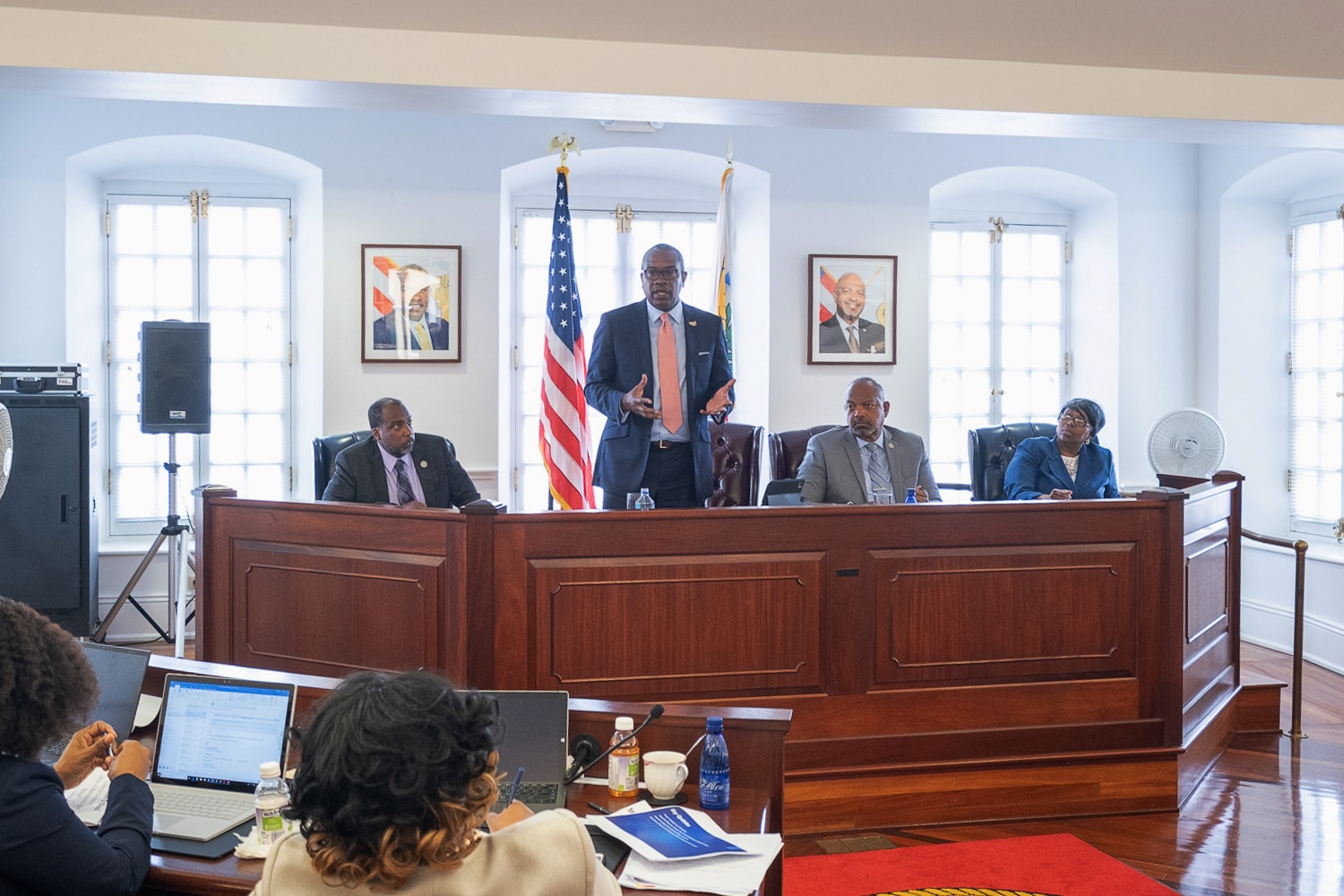CHARLOTTE AMALIE — Governor Albert Bryan has submitted to the 34th Legislature the first ever two-year Executive Budget and said revenue projections continue to increase during the next two years, providing an optimistic outlook for Fiscal Years 2022 and 2023.
Also included in the balanced budgets for both years are a number of highlights:
- Wage increases for government employees of 4% in FY 2022 and 3% in FY 2023
- $110M over both fiscal years for tax refunds
- $38 million for repayment of the 8% salary cut
- Funding for over 1,200 vacant government positions in FY 2022
- Up to $10 million in FY 2023 for unfunded obligations as deemed by the GERS judgement
- $2 million for ongoing payments to medical providers for Worker’s Compensation
- Over $15 million to be placed in the Rainy-Day Fund across both years
The Office of Management and Budget proposes a General Fund budget of $963,020,472 and Total Budget of $1,485,472,985 for FY 2022 and a General Fund budget of $976,372,193 and Total Budget of $1,513,302,379 for FY 2023.
Regarding the FY 2022 budget, it has increased an average of 20% over FY 2021, and a number of departments, including the Department of Justice, the Bureau of Corrections, the Motor Vehicles Bureau, Department of Human Services, and the Department of Agriculture have received increases over 30% from FY 2021. Schneider Regional Medical Center, Juan F. Luis Hospital and the Waste Management Authority also received increased budgets of 7% or higher than FY 2021.
Governor Bryan noted that this time last year the Territory was faced with many uncertainties relative to the economic instability brought on by the COVID-19 pandemic.
“While there has been some impact to our main economic driver, tourism, I am happy to present a budget that is undeniably increased and able to serve the needs of the people of the Virgin Islands,” Governor Bryan said. “In the midst of the pandemic, my administration has been agile and resourceful as we made real-time changes to our operations including the utilization of technology and remote work while maintaining our services to the community.
“These projections speak to positive investments being made in our economy, and that has stabilized our collections even throughout the pandemic. With continued disaster recovery funding and additional pandemic relief support being made available to the Territory through legislative acts such as the CARES Act and the American Rescue Plan, my administration is committed to ‘Building a Better Tomorrow,’ Governor Bryan said. “Capitalizing on these opportunities, we are making investments that will keep us on a long-term path of prosperity and stability.”
Other key initiatives presented in the budget include:
- Creation of the Office of Gun Violence Prevention and the Office of Health Information Exchange within the Office of the Governor
- Development of the Virgin Islands Territorial Park System through a collaboration with the Office of the Governor and the Department of Planning & Natural Resources
- $12 million over 2 years for the expanded Workforce Development Program at the Department of Labor.
The Bryan-Roach Administration also has budgeted to continue reinvesting in the Territory’s infrastructure, street paving and maintenance and is prepared to expend in excess of $1 billion over the next two years inclusive of disaster recovery projects.
The Territory has almost $3 billion currently available in federal grant funds to expend, with additional funds also already obligated but not yet received, and the Bryan-Roach Administration is committed to ensuring that as many projects as possible are started and completed by fiscal year 2023 to continue the strong economic growth.
The Governor said the benefits of presenting the Executive Budget in a biennial budget format for the first time include more time being spent on the management, oversight and implementation of the spending programs. The Administration anticipates making necessary adjustments prior to the start of FY 2023 as projections are updated and additional needs are determined, he said.
“This two-year budget was built utilizing our new budgeting software, OpenGov, and is the result of significant collaboration with departments and agencies and other stakeholders to address their needs and the needs of the Territory,” OMB Director Jenifer O’Neal said. “The result provides a strong blueprint for fiscal years 2022 and 2023 amid ever changing demands brought to the forefront by the ongoing COVID-19 pandemic.”

